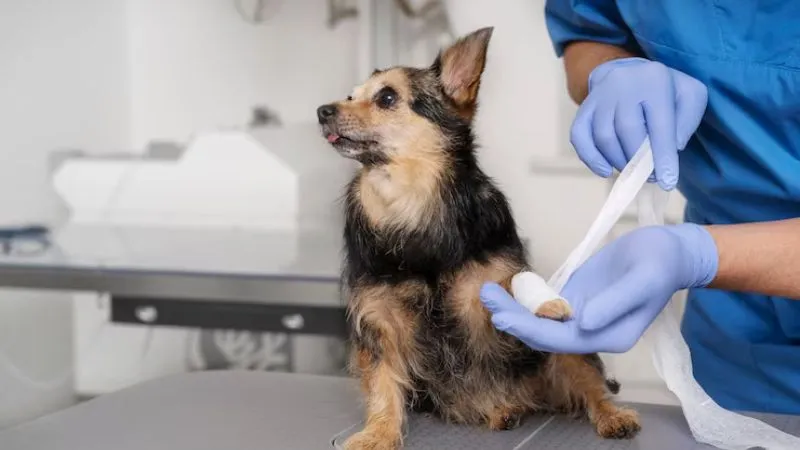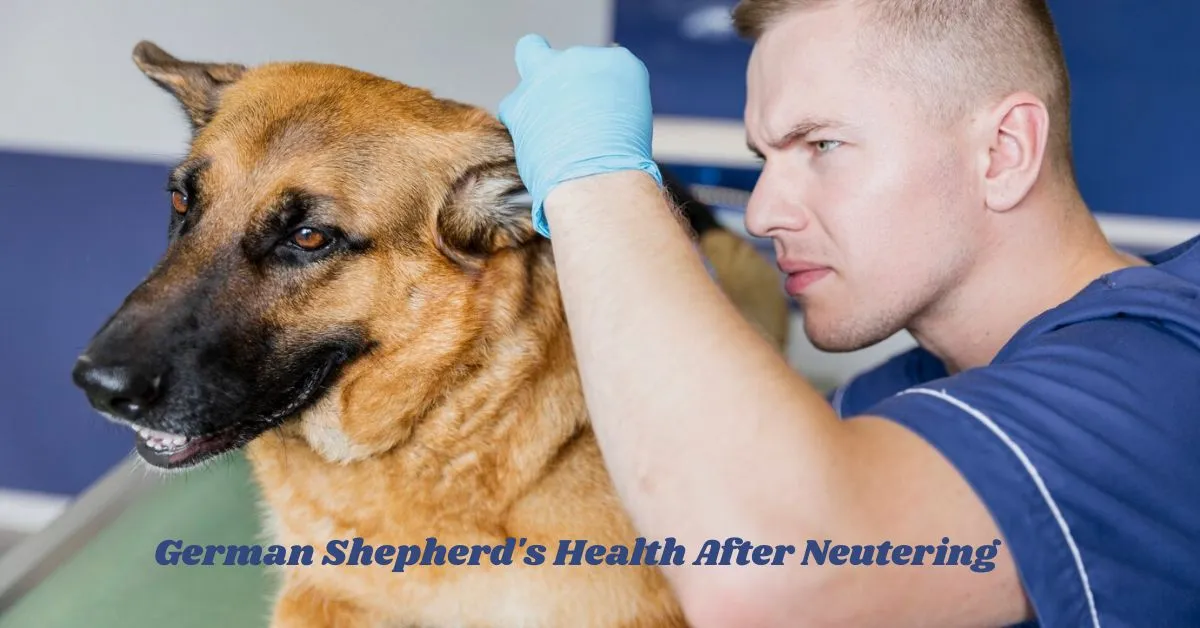After neutering your German Shepherd, focusing on their health and recovery is crucial. This surgery, while joint, requires extra care to ensure your furry friend heals well and stays happy. In this article, we’re diving into the essentials of post-neutering care, from managing pain to keeping them calm and everything in between.
We’ll share practical tips to help your German Shepherd bounce back stronger, emphasizing the importance of attentive care during this recovery period. So, let’s ensure your pup’s post-neutering phase is as smooth and comfortable as possible.
1. What Is the Need to Neuter a German Shepherd?
Neutering your German Shepherd is a vital step recommended by public animal well-being groups, including the ASPCA and Humane Society. This procedure addresses overpopulation and significantly reduces dogs’ health problems and behavioral issues.
1.1 Impact on Health and Behavior
Post-neutering, German Shepherds show a decrease in aggressive behavior and leg humping thanks to the reduction in testosterone. This leads to a healthier and more harmonious living environment for the dog and its owners.
1.2 Addressing Genetic Health Risks
Neutering helps mitigate the risk of genetic diseases such as cryptorchidism and hip dysplasia, everyday concerns that breeders and veterinarians highlight when discussing the procedure’s benefits.
1.3 Preventing Unwanted Offspring
One of the primary reasons for neutering is to prevent unwanted offspring, effectively reducing the population of stray animals and the burden on animal shelters and rescue groups.
1.4 Reducing the Risk of Cancer
The procedure significantly lowers the chances of cancer of the testicular. This health benefit cannot be overlooked when considering neutering for your German Shepherd.
1.5 Mitigating the Danger of Escapes
Neutering decreases the likelihood of your dog attempting to escape in pursuit of a female in heat, thus reducing the risk of life-threatening accidents or injuries.
1.6 Impact on Prostate Health
A lesser-known advantage of neutering includes the prevention of prostate issues, such as prostate disease and enlargement, along with abscesses and cysts.
1.7 Contribution to Public Health and Safety
By reducing behaviors like marking territory and the urge to wander or hunt, neutering your German Shepherd contributes to anti-sanitation efforts and public safety.
1.8 Support for Animal Shelters
Neutering helps control dog overpopulation, which supports animal shelters by reducing the euthanization of unwanted dogs.
1.9 Ensuring a Safe and Secure Pet
Making sure your German Shepherd is microchipped post-neutering is crucial for its safety, especially if it manages to escape or get lost, ensuring it can be returned safely.
Incorporating all the given words within these headings provides a detailed and structured overview of the importance of neutering your German Shepherd, covering health, behavioral, and societal aspects.
The neutering of my dog will change him, right?
When dog owners consider neutering their male dog, a common concern is whether the procedure will alter their pet’s personality. The truth, grounded in medically and behaviorally beneficial evidence, reassures that while neutering can lead to some changes, these are often positive. Neutering at 6 months of age, or even in older dogs, helps control the population of strays that might otherwise be euthanized and reduces the risk of complications in overweight or underweight dogs during operation.

Behaviorally, owners might notice a decreased urge to urine mark, roam, or escape, along with diminished aggression and socialization issues. This doesn’t mean your adult dog or pup loses their personality; rather, the absence of male sex hormones like testosterone can moderate behaviors such as the desire to mount other dogs, people, or objects.
The essence of your German Shepherd—his playfulness, work ethic, trains of thought, and general personality—remains intact. Traits and characteristics that define him stay unchanged, ensuring that the beneficial outcomes of neutering enhance, rather than diminish, the quality of life for both the pet and the owner.
What Is Neutering a German Shepherd?
Neutering, a term broadly encompassing the sterilization of both sexes—male dogs through castration and female dogs through spaying—is a surgical fixing procedure aimed at preventing unwanted pregnancies. For males, it involves the removal of the testicles, and for females, the surgery removes the uterus and ovaries.
This procedure can be performed on young animals and is executed through either open surgery or the more minimally invasive laparoscopic surgery. The traditional method for both genders involves an incision through which the removal occurs. In females, this might mean detaching the ovaries and uterus from the arteries and then closing the wound with sutures, staples, or special glue.
Laparoscopic surgery, often referred to as keyhole surgery, utilizes a telescopic rod with a lens connected to a monitor and carbon dioxide gas to inflate the abdomen for better visibility. Tools like graspers and a cauterizing instrument make precise cuts, enhancing recovery times and reducing pain. The process is relatively simple for males, involving isolation of the testicles through a small cut, ensuring careful location to prevent bleeding. The surgeon works meticulously, sealing both the bottom and top layers of the skin, often with stitches that dissolve, minimizing recovery time for your doggy.
Drawing from personal experience and expertise, I’ve witnessed firsthand the benefits of this surgery, not just in preventing overpopulation but also in reducing the risk of diseases and improving the overall quality of life for dogs.
Getting a German Shepherd neutered (spaying): Pros and Cons.
Deciding to neuter or spay a German Shepherd involves weighing the pros and cons of the decision. The benefits include a healthier life with reduced risks of certain diseases and behavioral improvements, while the drawbacks may involve the cost and potential risks associated with surgery. Drawing from personal expertise, this decision significantly impacts the well-being and temperament of a German Shepherd, underscoring the importance of informed consideration.
Pros of Neutering a GSD
Neutering a German Shepherd brings numerous medical and behavioral benefits, impacting the dog’s quality of life and the community.
Here’s a breakdown of the pros, incorporating all given terms:
Increased Life Expectancy: Research in Georgia, USA, has shown that neutered Shepherds tend to have a longer life expectancy than non-fixed dogs, with males particularly benefiting from fewer health issues.
Health Benefits: Sterilization significantly reduces the risk of infections, and cancer, including the elimination of non-cancerous prostatic hyperplasia and cancer of the testicles, prostate enlargement which can be painful and uncomfortable for aging dogs, and perineal hernia—a condition where weaker pelvic diaphragm allows organs to protrude near the anus area.
Behavioral Improvement: There’s a notable reduction of aggressive behavior in neutered dogs, which makes training and socializing more manageable for canine connoisseurs. The decrease in testosterone levels also lessens the likelihood of bad traumas and accidents resulting from roaming, a common issue during sexual maturity as young male dogs often attempt to escape in search of females, leading to situations where they could be hit by cars, damaged in a fight, or euthanize due to injuries.
Prevention of Unwanted Litter: Neutering prevents unwanted litter, thus reducing the number of German Shepherds in shelters and the burden on energetic owners who might otherwise need to deal with pregnant dogs, puppies, and associated health issues.
Cost Savings: The procedure itself is a cost-effective measure for owners, helping to save money in the long run by avoiding costly vet bills related to testicular cancer, prostate disease, traumatic injuries, and other health issues.
Home Care: Neutering reduces behaviors such as marking within the house, simplifying cleaning and training, and can make insurance more cost-effective, ultimately saving a fortune for the owner.
Public Health and Safety: By reducing the propensity for roaming and aggression, neutering contributes to public health and safety, lowering the risk of accidents and damaged property.
Community Impact: Encouraging the fixing of pets, including German Shepherds, supports community efforts to control the pet population, reducing the strain on shelters and the need to euthanize unadopted dogs.
Fixing Shepherd’sShepherd’s cons
While neutering presents several advantages for German Shepherds, it’s crucial to acknowledge the potential drawbacks:
Lost Reproductive Ability:
Neutering permanently eliminates a dog’s ability to reproduce, which might concern those wishing to breed their German Shepherd.
Hormonal Changes and Joint Disorders: The procedure can lead to hormonal changes that increase the risk of joint disorders such as hip dysplasia, mainly if done before the dog reaches age one.
Risk of Certain Types of Cancer:
Although neutering reduces the risk of testicular cancer, it may inadvertently increase susceptibility to other types, including hemangiosarcoma and immune-mediated diseases like hemolytic anemia.
Potential for Cognitive Decline:
Some studies suggest neutered male Shepherds may be more prone to dementia and cognitive decline, exhibiting symptoms like anxiety, circling, decreased learning, forgetfulness, and sleep disorders.
Changes in Coat Quality:
Neutering can affect the appearance and texture of a dog’s coat, particularly in long-haired Shepherds, making their hair appear longer and thinner.
Metabolic Changes:
The alteration in thyroid hormones post-neutering can lead to metabolic changes, including symptoms of hyperthyroidism such as hyperactivity, increased thirst, excess appetite, urination issues, and weight loss.
Surgery Risks:
Although relatively small, there are risks and complications associated with the surgery itself, which, in rare cases, can have fatal consequences for dogs.
Understanding these potential drawbacks is essential for owners to make an informed decision about neutering their German Shepherd, weighing the advantages against these considerations.
Final Thoughts
Spaying or neutering your German Shepherd is a significant choice. It’s something you need to think about carefully. You should look up information to understand the good and bad things about this operation. Overall, there are more good parts than bad parts. But it’s your job to consider whether this is right for your pet.
Once you spay or neuter, you can’t undo it, so make sure you know what it means and what could happen afterward. Spaying or neutering might change how aggressive your German Shepherd is because people have different thoughts about that.
If you’re hoping it will make your dog calmer, that alone shouldn’t make you decide to do it. So, take your time to learn everything about the surgery’s benefits and downsides, and then determine if it’s a good choice for your dog and your family.
FAQs
When Should You Spay a German Shepherd?
The ideal time to spay a German Shepherd is typically between 6 to 9 months of age. However, it’s important to consult your veterinarian, as the best timing can vary depending on your dog’s health, development, and lifestyle. Some vets may recommend waiting until after the first heat cycle in females to support long-term health benefits.
Do German Shepherds Calm Down After Neutering?
Yes, many German Shepherds experience a calming effect after neutering. The procedure reduces testosterone levels, which can help minimize aggressive, dominant, and territorial behaviors. However, it’s important to remember that training, socialization, and environment also play key roles in shaping a dog’s behavior.
Can Neutering Help with Aggression in German Shepherds?
Neutering may help reduce certain types of aggression, especially those linked to hormones, such as dominance or territorial aggression. While it can be effective, it’s not a one-size-fits-all solution. For more complex behavioral issues, professional training and consistent socialization are also essential.
How Much Does It Cost to Neuter a German Shepherd?
The cost of neutering a German Shepherd varies depending on your location, veterinary clinic, and your dog’s specific needs (age, size, health). On average, the procedure ranges from $50 to $300. Some animal shelters and low-cost clinics offer affordable or subsidized neutering services, so be sure to explore local options.
